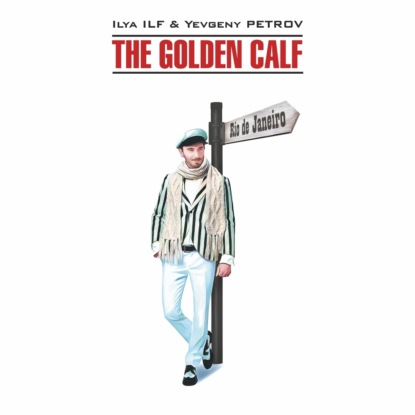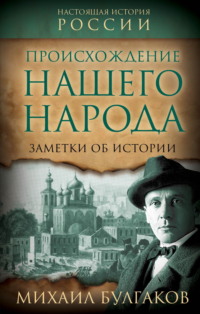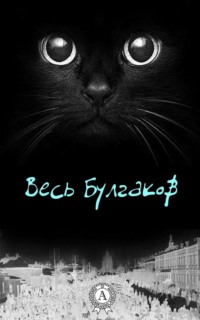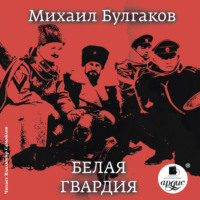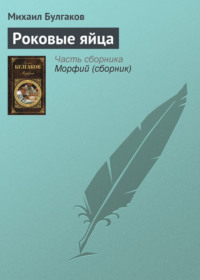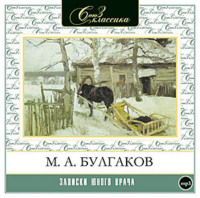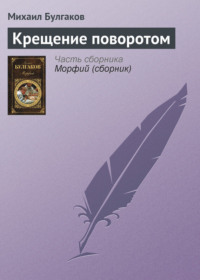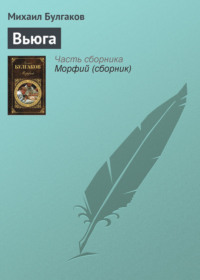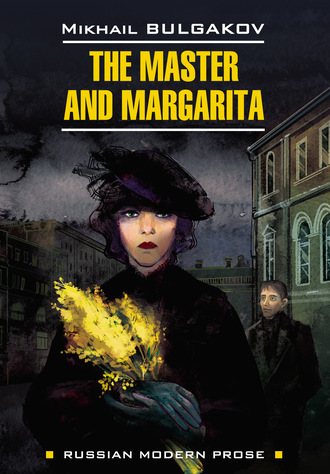
Полная версия
The Master and Margarita / Мастер и Маргарита. Книга для чтения на английском языке
Five minutes later, the residents of the building who were in the courtyard saw the Chairman, accompanied by two other persons, proceeding straight towards the gates of the building. They said Nikanor Ivanovich looked awful, that he was staggering like a drunken man as he passed by and was muttering something.
And another hour later, an unknown citizen came to apartment No. 11, at the very time when Timofei Kondratyevich was panting with pleasure as he told some other residents how the Chairman had been swept away; he beckoned with his finger for Timofei Kondratyevich to come out of the kitchen into the hall, said something to him, and together they disappeared.
10. News from Yalta
At the time misfortune overtook Nikanor Ivanovich, in the office of the Financial Director of the Variety, Rimsky, not far from No. 302 bis and on that same Sadovaya Street, there were two men: Rimsky himself, and the Variety’s manager, Varenukha.
The large office on the first floor of the theatre looked out onto Sadovaya from two windows, and from another – right behind the back of the Financial Director, who was sitting at the desk – onto The Variety’s summer garden, where there were refreshment bars, a shooting gallery and an open-air stage. The office’s furnishing, besides the desk, consisted of a bundle of old playbills hanging on the wall, a small table with a carafe of water, four armchairs and a stand in a corner on which there stood an ancient dust-covered model of some revue. Well, and it goes without saying that, apart from all that, there was in the office a battered, peeling, fireproof safe of small size, to Rimsky’s lefthand side, next to the desk.
Rimsky, sitting at the desk, had been in a bad frame of mind since first thing in the morning, while Varenukha, in contrast, had been very animated and active in an especially restless sort of way. Yet at the same time there had been no outlet for his energy.
Varenukha was now hiding in the Financial Director’s office from the people seeking complimentary tickets, who made his life a misery, particularly on days when the programme changed. And today was just such a day.
As soon as the telephone started ringing, Varenukha would pick up the receiver and lie into it:
“Who? Varenukha? He’s not here. He’s left the theatre.”
“Will you please ring Likhodeyev again,” said Rimsky irritably.
“But he isn’t at home. I sent Karpov earlier. There’s nobody at the apartment.”
“The devil knows what’s going on,” hissed Rimsky, clicking away on the adding machine.
The door opened, and an usher dragged in a thick bundle of newly printed additional playbills. On the green sheets, in large red letters, was printed:
TODAY AND EVERY DAY
AT THE VARIETY THEATRE
AN ADDITION TO THE PROGRAMME
PROFESSOR WOLAND
PERFORMANCES OF BLACK MAGIC
WITH ITS COMPLETE EXPOSURE
Stepping back from the playbill he had thrown over the model, Varenukha admired it for a moment and ordered the usher to have all copies pasted up immediately.
“It’s good, garish,” remarked Varenukha after the usher’s departure.
“Well, I find this undertaking displeasing in the extreme,” grumbled Rimsky, casting malicious looks at the playbill through horn-rimmed spectacles, “and in general I’m surprised he’s been allowed to put it on!”
“No, Grigory Danilovich, you can’t say that: it’s a very shrewd move. The whole point here is the exposure.”
“I don’t know, I don’t know, there’s no point here at all, and he’ll always go thinking up something of the sort! He could at least have shown us this magician. You, have you seen him? Where he dug him up from the devil only knows!”
It transpired that Varenukha, just like Rimsky, had not seen the magician. The day before, Styopa had come running (“like a madman” in Rimsky’s expression) to the Financial Director with a draft agreement already written, had ordered him there and then to copy it out and to issue the money. And this magician had cleared off[239], and nobody had seen him except Styopa himself.
Rimsky took out his watch, saw that it said five past two, and flew into an absolute fury. Really! Likhodeyev had rung at about eleven o’clock, said he would be arriving in half an hour, and not only had he not arrived, he had also vanished from his apartment!
“My work’s being held up[240]!” Rimsky was now growling, jabbing his finger at a heap of unsigned papers.
“He hasn’t fallen under a tram, like Berlioz, has he?” said Varenukha, holding up to his ear a receiver in which could be heard ringing tones, rich, prolonged and completely hopeless.
“That would be a good thing, actually…” said Rimsky, scarcely audibly through his teeth.
At that very moment a woman came into the office wearing a uniform jacket, peaked cap, a black skirt and soft shoes. From a small bag on her belt the woman took a little white square and a notebook and asked:
“Who’s Variety? Super-lightning for you. Signature.”
Varenukha dashed off some sort of squiggle in the woman’s notebook and, as soon as the door had slammed behind her, he opened up the little square.
Having read the telegram, he blinked his eyes a bit and passed the little square to Rimsky.
Printed in the telegram was the following: “Yalta. Moscow. Variety. Today half eleven appeared CID nightshirted trousered bootless mental brunet claimed Likhodeyev Director Variety. Lightning-wire Yalta CID whereabouts Director Likhodeyev.”
“Well I never!” exclaimed Rimsky, and added: “Another surprise!”
“A False Dmitry,”[241] Varenukha said, and began speaking into the mouthpiece of the telephone: “Telegraph Office? The Variety’s account. Take a super-lightning. Are you listening?. “Yalta CID. Director Likhodeyev Moscow. Financial Director Rimsky’.”
Regardless of the communication about the impostor in Yalta, Varenukha once more set about hunting for Styopa on the telephone anywhere and everywhere, and naturally could find him nowhere.
At the precise time when Varenukha, holding the receiver in his hand, was pondering over where else he might phone, that same woman who had brought the first lightning telegram came in and handed Varenukha a new little envelope. Opening it hurriedly, Varenukha read through what was printed on it and then whistled.
“What else?” asked Rimsky with a nervous jerk.
Varenukha handed him the telegram in silence, and the Financial Director saw in it the words: “Implore believe. Cast Yalta by hypnosis Woland. Lightning-wire CID confirmation identity. Likhodeyev”.
Rimsky and Varenukha reread the telegram with their heads touching, and when they had reread it, they stared at one another in silence.
“Citizens!” the woman suddenly grew angry. “Sign for it, and then you can be silent for as long as you like! It’s lightning telegrams I’m delivering, you know.”
Without taking his eyes off the telegram, Varenukha dashed off a wonky signature in the notebook and the woman disappeared.
“But you were talking to him on the telephone just after eleven?” began the manager in complete bewilderment.
Конец ознакомительного фрагмента.
Текст предоставлен ООО «ЛитРес».
Прочитайте эту книгу целиком, купив полную легальную версию на ЛитРес.
Безопасно оплатить книгу можно банковской картой Visa, MasterCard, Maestro, со счета мобильного телефона, с платежного терминала, в салоне МТС или Связной, через PayPal, WebMoney, Яндекс.Деньги, QIWI Кошелек, бонусными картами или другим удобным Вам способом.
Примечания
1
pork-pie hat – шляпа с круглой плоской тульёй, шляпа-"пирожок”
2
MASSOLIT: The organization is an invention of Bulgakov’s. (Комментарий И. Беспалова)
3
MASSOLIT – Массолит – вымышленное объединение литераторов
4
Bezdomny: The poet’s pseudonym, reminiscent of those of Maxim Gorky (“bitter”), Demyan Bedny (“poor”) and others, means “homeless”. (Комментарий И. Беспалова)
5
Narzan: Sparkling mineral water. (Комментарий И. Беспалова)
6
to take umbrage – обижаться
7
in a hoarse voice – хриплым, осипшим голосом
8
to quench one’s thirst – утолять жажду
9
heart gave a thump – сердце встрепенулось
10
mocking physiognomy – глумливая физиономия
11
horror-stricken – охваченный ужасом
12
to have a seizure – получить удар
13
to let somebody down – подвести к.-л.
14
Philo of Alexandria: a philosopher and religious thinker (c.25 bc-50 ad). (Комментарий И. Беспалова)
15
Philo of Alexandria – Филон Александрийский, философ и религиозный мыслитель
16
Flavius Josephus: Roman historian (37 ad-after 100). (Комментарий И. Беспалова)
17
Flavius Josephus – Иосиф Флавий, еврейский историк и военачальник
18
sound erudition – блестящая эрудиция
19
the celebrated Annales of Tacitus: The chronicle Annales by Gaius Cornelius Tacitus (c.55-c.120) deals with Roman history of the years 14–68. (Комментарий И. Беспалова)
20
Annales of Tacitus – «Анналы», последнее и самое крупное сочинение древнеримского историка Публия Корнелия Тацита
21
to clamber into the thickets – лезть в дебри
22
Osiris… and earth: The Egyptian god of death, life and fertility. (Комментарий И. Беспалова)
23
Osiris – Осирис, бог смерти в египетской мифологии
24
Tammuz: The Mesopotamian god of fertility. (Комментарий И. Беспалова)
25
Tammuz – Таммуз, бог плодородия в др. Месопотамии
26
Marduk: The most important god in the Babylonian pantheon. (Комментарий И. Беспалова)
27
Marduk – центральное божество вавилонского пантеона, главный бог города Вавилона
28
Huitzilopochtli – Вицлипуцли, бог войны у древних Ацтеков
29
Huitzilopochtli… Aztecs in Mexico: The Aztec sun and war god. (Комментарий И. Беспалова)
30
small in stature – маленького роста
31
enormous in stature – высоченного роста
32
to exchange bows – раскланиваться
33
a squeal of curiosity – возглас любопытства
34
Immanuel’s idea – ссылка на философа Иммануила Канта, его анализ традиционной аргументации существования Бога и им же приведенное новое доказательство
35
Immanuel's idea. also unconvincing: a reference to the philosopher Immanuel Kant (1724–1804), his analyses of the traditional arguments for the existence of God and his own attempt at a new one. (Комментарий И. Беспалова)
36
Schiller: The German poet and dramatist Friedrich von Schiller (1759–1805). (Комментарий И. Беспалова)
37
Schiller – Фридрих фон Шиллер, немецкий поэт и драматург
38
Strauss: The German theologian David Strauss (180874). In his major work, The Life ofJesus, he made the pioneering step of taking a historical approach to Christ’s existence. (Комментарий И. Беспалова)
39
Strauss – Давид Штраус, немецкий теолог
40
Solovki: The popular name for the prison camp established at the Solovetsky Monastery on an island in the White Sea. (Комментарий И. Беспалова)
41
to blur out – сболтнуть, «ляпнуть»
42
to send somebody into raptures – приводить к.-л. в восторг
43
to make fun of – высмеивать
44
with a twinkle in one’s eye – сверкнув глазом
45
a trifling matter – пустяковое дело
46
Our Brand – «Наша Марка» (название сигарет)
47
without rhyme or reason – ни с того ни с сего
48
to get drawn – вовлекаясь
49
free-and-easy – развязный
50
to pull aside – оттаскивать в сторону
51
to pump about – выспрашивать
52
Gerbert of Aurillac: Otherwise known as Pope Sylvester II (938-1003). (Комментарий И. Беспалова)
53
Gerbert of Aurillac – папа Сильвестр II
54
Nisan: The Jewish month which lasts for twenty days at the end of March and the beginning of April, with the seven days of the Feast of the Passover beginning on the 14th. (Комментарий И. Беспалова)
55
Herod the Great: Herod (74-4 bc) was king of Judaea from 40 bc until his death. (Комментарий И. Беспалова)
56
Pontius Pilate: Pilate was Procurator of Judaea from 26 to 36 ad. (Комментарий И. Беспалова)
57
Yershalaim: An alternative transliteration for “Jerusalem” from the Hebrew. (Комментарий И. Беспалова)
58
to give a decision on the case – дать заключение по делу
59
hellish pain – адская боль
60
to blot out – затемнять, отбрасывать тень
61
to tug up – поднять рывком
62
Hegemon: “Leader” (Greek). (Комментарий И. Беспалова)
63
Yeshua: “The Lord is salvation” (Aramaic). (Комментарий И. Беспалова)
64
Ha-Nozri: “From Nazareth” (Aramaic). (Комментарий И. Беспалова)
65
to hunch over – склоняться
66
to muddle up – напутать
67
to tense up – напрягаться
68
to cast a surreptitious look of surprise – бросить удивленный взгляд
69
in a plaintive voice – жалобным голосом
70
to stir up – путать народ
71
involuntary torturer – невольный мучитель
72
to suppress by will-power – подавить усилием воли
73
to turn deathly pale – смертельно побледнеть
74
to imagine in precisely – детально вообразить
75
a fearsome sort of smile – страшная улыбка; улыбка, не предвещающая ничего хорошего
76
Dismas. Gestas. Bar-rabban: Dismas and Gestas are the apocryphal names given to the two thieves crucified alongside Jesus. Bar-rabban is a lesser-known variant of the name Barabbas. (Комментарий И. Беспалова)
77
Battle of Idistavizo: The battle was fought between the Romans and German tribes on the right bank of the Weser in 16 ad. (Комментарий И. Беспалова)
78
corpus delicti – (лат.) состав преступления
79
to change countenance – измениться в лице
80
sparsely toothed golden crown – золотая корона с редкими зубцами
81
to be done for – погибать
82
in a choked, angry voice – глухим, злым голосом
83
Lit the lamps: Jewish law apparently required that two candles were lit to establish that hidden witnesses were able to see the accused properly. (Комментарий И. Беспалова)
84
to scribble the words down on the parchment – вычерчивать слова на пергаменте
85
Emperor Tiberius: Tiberius Claudius Nero (42 bc-37 ad), second Emperor of Rome from 14 ad. (Комментарий И. Беспалова)
86
a matter of state – государственное дело
87
caligæ – калиги
88
caligæ: The Latin term for the boots worn by Roman soldiers. (Комментарий И. Беспалова)
89
to break off – ломаться
90
to drop down in little streams – стекать тонкими струйками
91
to stagger backwards – отшатнуться
92
mournfully somehow – как-то тоскливо
93
Bald Mountain – Голгофа
94
Bald Mountain: Known in the Gospels as Golgotha. (Комментарий И. Беспалова)
95
to cordon off – вводить оцепление
96
ala – ала, сирийский кавалерийский полк
97
ala: a division of allied horsemen providing flanking cover for a legion in battle, from the Latin word for “wing”. (Комментарий И. Беспалова)
98
to speak in advance – говорить заранее
99
to carry out the order – выполнять приказ
100
an extraordinary sort of frenzy – с необыкновенной яростью
101
from under – из-за
102
to ratify the death sentence – вынести смертный приговор
103
to set free – отпускать на свободу
104
direct call to revolt – прямой призыв к мятежу
105
to be smothered and scorched by – удушая и обжигая
106
the rage of impotence – гнев бессилия
107
I feel stifled – Тесно мне
108
a semblance of a smile – подобие улыбки
109
to on that score – учитывая это
110
Pontius Pilate, the horseman of the Golden Lance – Пилат Понтийский, Всадник Золотое Копье
111
horseman of the Golden Lance: This refers to an equestrian order of the Roman nobility, below only the Senate in its importance. By Pilate’s time, many members of the order filled administrative posts. (Комментарий И. Беспалова)
112
to be covered in blotches – быть покрытым пятнами
113
Herod the Great – Ирод Великий, царь Иудеи
114
to convey the conference – собирать совещание
115
incitement to revolt – подстрекательства к мятежу
116
assault on the laws and faith – оскорбление законов и веры
117
to work up ever more of a canter – «забирать» больше рыси, наращивать шаг и скорость в скачке на лошади
118
the stories in the Gospels – Евангельские рассказы
119
to refer to the Gospels as a historical source – ссылаться на Евангелие как на исторический источник
120
to be taken aback – быть захваченным врасплох
121
in a faltering voice – дрогнувшим голосом
122
to wink at – заговорщицки подмигивать
123
to slump down – падать, обрушиваться
124
in a tone of feigned friendliness – фальшиво-ласковым тоном
125
in one’s wake – вслед
126
to set to rights – прийти в порядок, поправиться
127
to slop down – скользить
128
to catch hold of something – ухватиться за ч.-л.
129
to bounce up – подпрыгивать
130
a sloping verge – откос
131
to rush off – броситься бежать, поспешить
132
to take words in – воспринимать слова
133
a deranged mind – расстроенный мозг
134
in a muffled voice – глухим голосом
135
to butt in – встревать в разговор
136
to leap up – резко вскакивать
137
the good-for-nothing – негодяй
138
to catch up with – догонять
139
to hurtle into – врезаться
140
to slip away – убегать, смываться
141
to freeze in immobility – застыть на месте
142
to leap up – вскакивать
143
to ride off – уезжать
144
to mess around – трепаться
145
to blame for – винить, обвинять
146
wedding candles – венчальные свечи
147
wedding candles: a traditional part of the Orthodox marriage ceremony, during which they are held by the bride and groom. (Комментарий И. Беспалова)
148
tolstovka: a traditional Russian shirt. (Комментарий И. Беспалова)
149
Eugene Onegin: Pyotr Ilyich Tchaikovsky (1840-93) wrote this opera, first performed in 1879, which was based on the novel in verse Eugene Onegin (1825-32) by Alexander Pushkin (1799–1837). (Комментарий И. Беспалова)
150
Tatyana: Tatyana Larina, the heroine of Eugene Onegin. (Комментарий И. Беспалова)
151
to tower up – возвышаться
152
The house was called… Griboyedova: a reference to the writer Alexander Sergeyevich Griboyedov (1795–1829), a playwright and poet whom Bulgakov was known to admire. (Комментарий И. Беспалова)
153
The Misfortune of Wit – «Горе от ума», комедия в стихах А. С. Грибоедова
154
The Misfortune of Wit: Also translated as Woe from Wit and The Woes of Wit, this verse satire, first published in 1825, was Griboyedov’s masterpiece. (Комментарий И. Беспалова)
155
Perelygino: The area outside Moscow where there was a concentration of dachas for writers in Soviet times is called Peredelkino. (Комментарий И. Беспалова)
156
Housing Question – квартирный вопрос
157
au naturel – (фр.) в натуральном виде, без приправ


